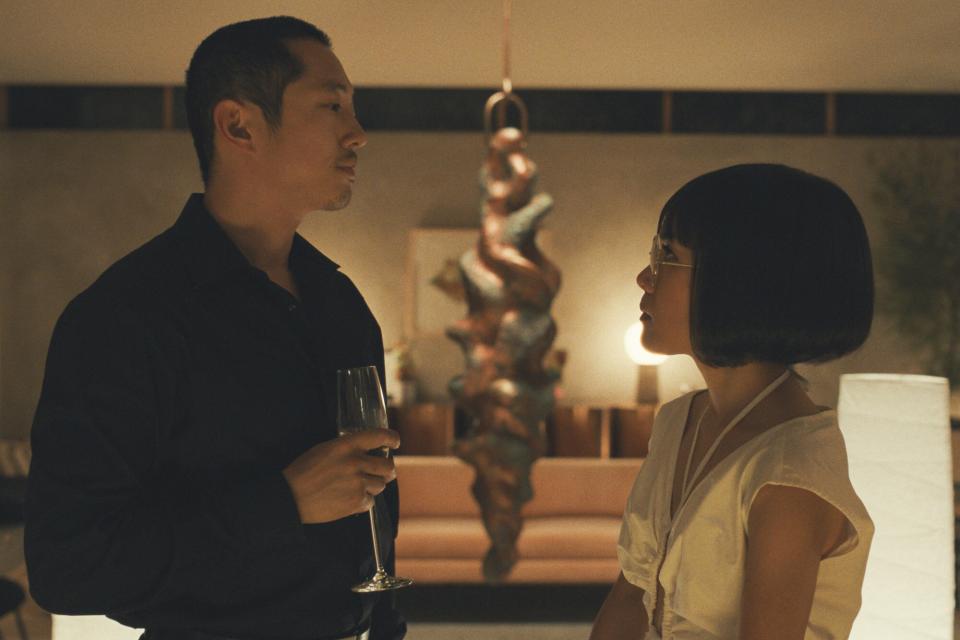Beef review: Searing performances from Steven Yeun and Ali Wong give this revenge dramedy bite
- Oops!Something went wrong.Please try again later.
The trailer for Beef, the new Netflix series starring Steven Yeun and Ali Wong, makes it look like a darkly comic road-rage revenge caper. That's accurate — up to a point. What begins as a manic vengeance adventure veers sharply into an intense, philosophical, and at times meandering exploration of generational trauma, the Asian immigrant experience, and the fathomless mystery of our inner selves.
Entrepreneur Amy Lau (Wong) is on the cusp of financial freedom. For two years, she's been working on a deal to sell her designer plant company, Kōyōhaus, to Forsters, a big-box chain owned by a mercurial billionaire named Jordan Forster (Maria Bello). In the meantime, Amy supports her family — George (Joseph Lee), her woo-woo artist husband, and Junie (Remy Holt), her anxiety-prone daughter — paying for everything from their beautiful Calabasas house to the organic gardening playgroups George wants Junie to attend. Thirty miles east in Los Angeles, Danny Cho (Yeun) is hustling to keep his struggling contracting business afloat so he can support his layabout brother, Paul (Young Mazino), and help his elderly parents (Jerry Hanjoo Kim and Gina Lee), who have fallen on hard times.
Consumed with myriad external pressures — and lacking any outlet to release them — Amy and Danny reach a simultaneous breaking point in the Forsters parking lot. Angry and distracted after the store refused to take a return without a receipt, Danny nearly backs his truck into Amy's white Mercedes SUV. A tire-screeching, trash-tossing chase ensues through manicured suburban streets, but Amy speeds off before either of them can sate their thirst for retribution. Frustrated and activated by a new target for his impotent fury, Danny exacts a messy but effective punishment on his automotive antagonist — which launches them into a progressively sinister spiral of retaliation.

Andrew Cooper/Netflix Maria Bello and Ali Wong on 'Beef'
The tantalizing "if only" of Amy and Danny's relationship — if only they'd stop and talk to each other, they'd realize how much they have in common — drives the early stages of Beef's narrative. The businesswoman and the handyman may come from different tax brackets, but they're both running at full speed to overtake a sense of security that remains maddeningly out of reach. Forsters, the site of Amy and Danny's fateful first encounter and a symbol of the largely white establishment that holds the keys to the quote-unquote American dream, is a consistent presence as their feud continues. "There's always something" is one of Amy and Danny's recurring gripes, their plea to the heavens for just a modicum of peace. For Jordan Forster, though, it's a guiding principle. "Everything fades, Amy. People, things, experiences," she says, while showing off her collection of priceless crowns from ancient cultures all over the world. "You just gotta keep grabbing what you can, right? That's what makes life so wonderful. There's always something."
Creator Lee Sung Jin serves up several intriguing dichotomies throughout Beef's winding 10-episode run. George's insistence on relentless positivity ("Anger is just a transitory state of consciousness") only serves to fuel Amy's sense of helplessness and deepen the toxicity of her anger. Danny and Amy start off as strangers, making them perfect receptacles for each other's roiling rage. But as they entrench further into the vendetta, insinuating themselves into the lives of George and Paul, respectively, they discover that strangers can also be an ideal vessel for their most vulnerable confessions.
Yeun and Wong are exceptional. Danny and Amy are roles that call for physical and intellectual comedy, apoplectic rage and stifled, stomach-churning frustration, abject despair and numbing emptiness. The actors integrate it all seamlessly while maintaining the aching humanity of their increasingly unlikable characters. Eventually, the destructive domino effect of Danny and Amy's ongoing conflict forces them into brief periods of reflection; some revelations make our squabbling protagonists more sympathetic, while others expose how much damage they've caused to those around them. Paul wasn't always a monosyllabic loafer on the lookout for easy money, and Mazino reveals the poignant loneliness dwelling inside Danny's sweet, stymied little brother. And Ashley Park (Emily in Paris) gets a welcome showcase as Naomi, Amy's friend (and Jordan's sister-in-law) who proves to be more than just a bored housewife.

Netflix Steven Yeun and Ali Wong on 'Beef'
Even with the excellent ensemble — which also includes David Choe as Danny's connected cousin, Isaac, and Patti Yasutake as George's doting mom, Fumi — Beef suffers from pacing issues. It's classic Netflix Bloat™; the middle episodes tend to drag, and at times they feel like a string of well-acted but disconnected vignettes. There are wonderful moments (Danny and Paul razzing each other while playing Nerf basketball in their apartment), but often it feels as though the show, like Amy and Danny, is stuck in its own repeating cycle rather than simply moving forward. "It is selfish for broken people to spread their brokenness," admits Amy in episode 4. And yet she keeps doing it, as does Danny, for most of the remaining six episodes.
The longer Beef goes the darker it gets, as Danny and Amy continue to choose violence, literal and emotional, not caring how it hurts the people in their orbit. Neither they nor the viewer can figure out what's truly driving their actions; every time either Danny or Amy comes close to a moment of genuine introspection, they quickly deflect and channel those ugly feelings into targeting the other. The episodes are titled after fragments of quotes from famous thinkers — Franz Kafka ("I Am a Cage"), Simone de Beauvoir ("The Drama of Original Choice"), Joseph Campbell ("The Rapture of Being Alive") — all contemplating the enigma of human perception and motivation. Happiness remains elusive for Danny and Amy, even in victory. "Everything fades. Nothing lasts," she tells him in a rare moment of peace. "We're just a snake eating its own tail."
Just as it seems that Beef is going to go full misanthrope in its chaotic, surreal final episodes, the show pulls itself back from the brink of utter hopelessness at the end. The decision left me a bit puzzled, but perhaps there's a clue to Lee Sung Jin's thinking in the finale's title, which is taken from this quote by Carl Jung: "One does not become enlightened by imagining figures of light, but by making the darkness conscious. The latter procedure, however, is disagreeable and therefore not popular." Indeed, Beef is not afraid to plumb some very disagreeable depths to tell the story of two damaged people fighting their way back to the light. Grade: B
Beef premieres Thursday, April 6, on Netflix.
Sign up for Entertainment Weekly's free daily newsletter to get breaking TV news, exclusive first looks, recaps, reviews, interviews with your favorite stars, and more.
Related content:

